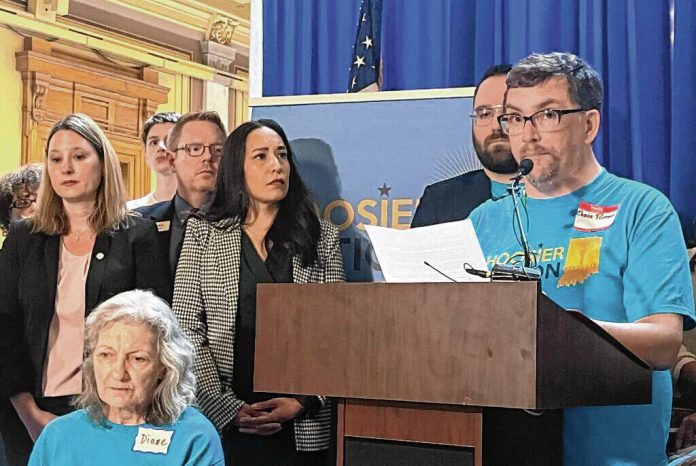Advocates lamented a lack of action on Wednesday on two priority bills for the grassroots organization Hoosier Action, which would have explicitly decriminalized fentanyl test strips and established rent escrow accounts.
Jennings Tennery, of Mooresville, testified that a test strip saved her life as a recovering heroin and opioid addict. She described her addiction as one of shame that compelled her to use privately, a danger when she overdosed.
By chance, she had a fentanyl testing strip after purchasing some drugs and decided to test. The positive result prompted her to use with someone else nearby who was able to call when she overdosed.
“I did still choose to use it but it gave me a moment to pause where I can, at that moment, decide, ‘Do I want to use alone today? Do I want to in my care, drive away and maybe not ever wake up?’” Tennery shared with a small group at the Statehouse.”It would be a better story if I say that stopped me from using entirely but it did change my decision slightly enough to save my life.”
State law unclear
But such test strips aren’t universally available in Indiana. State law is vague enough to allow prosecutorial discretion, meaning that some communities can charge Hoosiers for possession of paraphernalia.
A proposal to clarify the statute passed the House but failed to get a hearing in the Senate, though authors promised to try again in 2025.
“I want more stories like Jennings; I want us as a state to see more stories of recovery,” said Rep. Victoria Garcia Wilburn, the author of House Bill 1053. “None of us should die on our darkest day … We care so much about life in the Statehouse. We say that day after day. This is another way that we could have made good on that promise.”
Garcia Wilburn, a Democrat from Fishers, noted that explicit decriminalization would also open up funding for communities to access federal dollars dedicated to harm reduction and recovery resources.
Her co-author, Republican attorney Rep. Jennifer Meltzter, noted that the veterinary drug xylazine was now cut into street drugs — another topic tackled by legislators this year. But Hoosiers would only know that if they had access to testing strips.
“The number of substances that are being laced into our illicit drugs will only continue to grow … there is no harm reduction other than a test strip that is going to allow someone to know that xylazine is in their drugs and Narcan does not work if someone overdoses on xylazine,” Meltzer, of Shelbyville, said. “… This bill is so important to make sure that we can continue to save lives.”
Breanna Baldwin, the director of harm reduction with Overdose Lifeline, noted that Marion County’s elected officials had indicated that they supported her organization’s efforts to distribute testing strips. However, some Hoosiers are still prosecuted.
In 2023, Hoosiers requested over 170,000 strips from Overdose Lifeline followed by 30,000 so far in 2024.
“There’s a very obvious need for test strips across the state of Indiana … test strips do not test for the strength, effectiveness or purity of an illicit substance as stated in Indiana state code,” Baldwin said. “Having access to these test strips allows people to make better decisions about what they are deciding to ingest, how much they’re deciding to ingest and if they’re wanting to ingest at all.”
Housing bill
Another bill highlighted by activists was Senate Bill 277, which would have substantially changed the balance of power in Indiana’s landlord-friendly laws.
Indiana is one of six states that don’t allow tenants to pay rent into an escrow account when landlords fail to make essential repairs, such as plumbing leaks, broken doors or windows and heating issues. Additionally, cities and counties would be able to place units into receivership in certain cases. Despite having a Republican author — Sen. Greg Walker of Columbus — the bill wasn’t even heard by a committee this year.
“The lack of affordable housing is something that every state sees but Indiana actually has a larger shortage of safe, affordable housing than the typical Midwest state. In Indiana, there’s only 39 affordable and available rental units for every 100 extremely low-income households,” said Andrew Bradley, the policy director for Prosperity Indiana. “We need tools like (Senate Bill) 277 but, unfortunately, it wasn’t given a hearing.”
Bradley, speaking on behalf of the Hoosier Housing Needs Coalition, called on Gov. Eric Holcomb to appoint a commission on housing affordability and stability following inaction from the General Assembly.
By Whitney Downard –The Indiana Capital Chronicle is an independent, not-for-profit news organization that covers state government, policy and elections.





